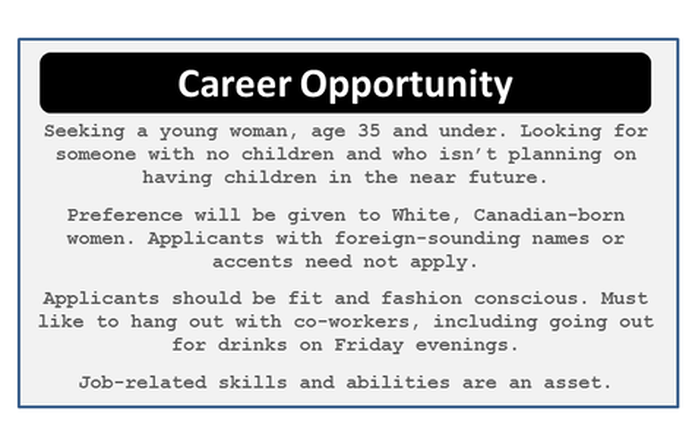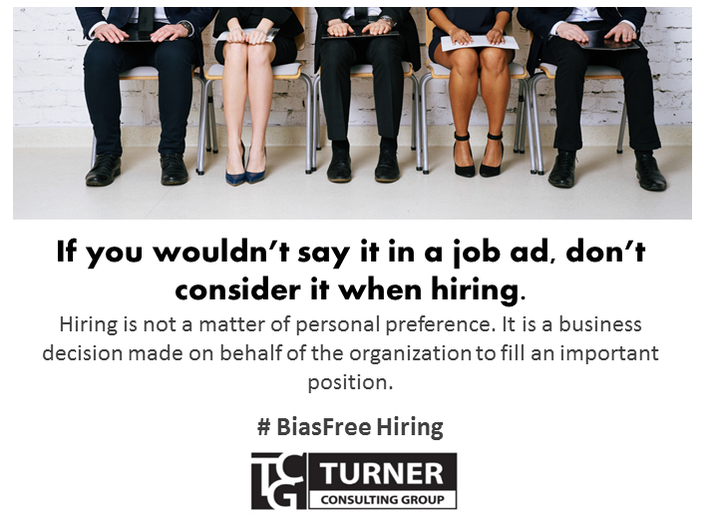|
Each organization conducts hiring differently. Some use informal hiring processes and pay a great deal of attention to whether the candidate is of similar background and has similar interests to existing staff, and whether they will fit in with the others in the organization. Some organizations have more formal hiring processes, but may allow managers to consider a range of factors unrelated to the candidate's skills and abilities to do the job. In many organizations, unconscious biases play a role in the selection of new employees, and racial and gender stereotypes may influence who is hired into which positions. If you wouldn't put it in a job ad, don't consider it when hiring6/20/2017
0 Comments Each organization conducts hiring differently. Some use informal hiring processes and pay a great deal of attention to whether the candidate is of similar background and has similar interests to existing staff, and whether they will fit in with the others in the organization. Some organizations have more formal hiring processes, but may allow managers to consider a range of factors unrelated to the candidate's skills and abilities to do the job. In many organizations, unconscious biases play a role in the selection of new employees, and racial and gender stereotypes may influence who is hired into which positions. In some organizations, managers are permitted to ask questions in addition to the pre-determined questions to "see how the candidate thinks". They may also ask interview questions that don't assess the candidate's skills and abilities for the job, such as:
Some organizations hold group rather than one-on-one interviews, which often results in them assessing the extrovertedness of candidates because group interviews advantage extroverted candidates and disadvantage introverts. Some managers require that the candidate “sell themselves” by asking questions such as:
In some cases, managers consider how the job candidate is dressed, their grooming, or their accent. Some may also misinterpret and apply a great deal of meaning to non-verbal behaviours such as eye contact and smiling. In some interviews, job candidates are asked about hobbies and interests so that the hiring manager can get to know the candidates better because they are hiring into a "family." In these cases managers are really hiring friends not employees. There are also managers who place a great deal of importance on handshakes. Some think that the "wet noodle" handshake is a sign of a weak personality. Some women may interpret the "lady-shake" from a man as an indication that he is sexist and that he wouldn't do good work for a female manager. Managers may not consider that a handshake is not a measure of someone’s character, or that the candidate’s handshake may be impacted by culture (not all cultures shake hands, so not everyone has practiced giving a firm handshake) or disability (the person may have arthritis). In order to ensure they are engaging in bias-free hiring, hiring managers should clearly articulate the skills and abilities for the position, and how they will be identified and assessed in the hiring process. They need to reflect on the soft skills needed for the position (e.g., communication skills, interpersonal skills, etc.,) and how they will be assessed. It is also important to identify additional skills and characteristics that are important to the hiring manager. Specifying the skills, abilities, soft skills, and characteristics you are looking for when hiring, and prioritizing them, helps to distinguish between job-related skills and abilities and personal characteristics which may trump them. Are you prioritizing looks over skills? Personality over competence? A handshake over job-related knowledge? Whether you like someone over technical knowledge? After you’ve decided what is important to you, consider whether you would list these characteristics on a job ad -- because if you wouldn't include these characteristics on a job ad, you probably shouldn't be considering it.
0 Comments
Your comment will be posted after it is approved.
Leave a Reply. |
TANA TURNERTana Turner is Principal of Turner Consulting Group Inc. She has over 30+ years of experience in the area of equity, diversity and inclusion. Categories
All
|


